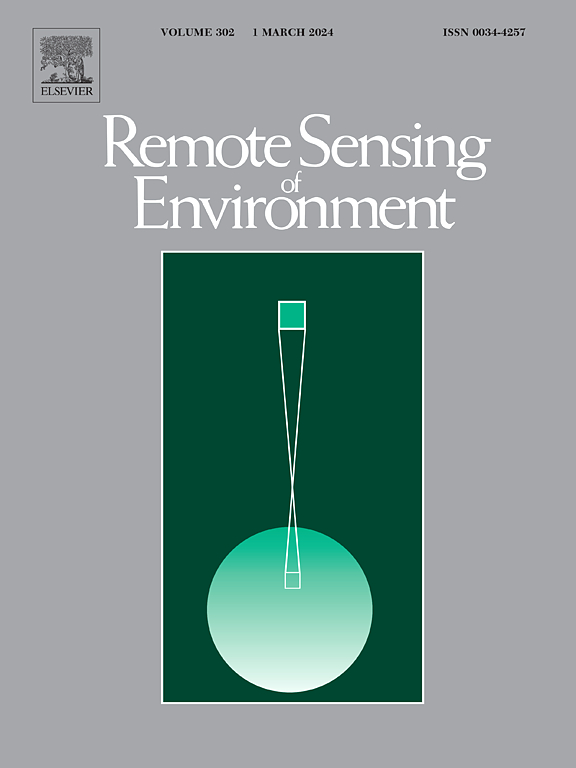用于沿海和内陆水域遥感的传感器邻接效应校正
IF 11.1
1区 地球科学
Q1 ENVIRONMENTAL SCIENCES
引用次数: 0
摘要
邻近效应会扭曲沿岸和内陆水域的大气顶(TOA)光谱信号,是近岸水生环境光学遥感的一大挑战。我们引入了一个闭式表达式,可在大气校正之前校正邻近效应。该方法包含在一个开源 Python 工具中,该工具可接收一级图像,并计算大气的点扩散函数,对输入图像进行卷积。对于每个波段,观测到的反射率与卷积反射率之间的差值被用来量化和校正邻近效应,即像素被校正为其被相同反射率的像素包围时的 TOA 反射率。根据全球重合原地辐射测量数据集,对哨兵-2 MSI 和 Landsat 8 OLI 图像进行了验证。结果表明,当大气校正处理器(包括 ACOLITE、POLYMER 和 l2gen)在邻接效应校正后应用时,其得出的水叶反射率的准确性有所提高。对于海岸线 200 米范围内的匹配(n = 212),邻接效应校正使三种处理器的均方根误差平均降低了 16.7%,对称符号百分比偏差降低了 32.4%,中位对称精度降低了 36.8%。ACOLITE 的改进在近红外 (NIR) 范围内更为显著,l2gen 的改进在可见光波长范围内更为显著,而 POLYMER 的改进则在可见光-近红外光谱范围内均匀分布。我们预计,这种基于物理学的邻近效应校正方法,将改进在不同大气和水生条件下沿海和内陆水域的卫星水生产品。本文章由计算机程序翻译,如有差异,请以英文原文为准。
Sensor-generic adjacency-effect correction for remote sensing of coastal and inland waters
The adjacency effect distorts the top-of-atmosphere (TOA) spectral signals of coastal and inland waters and is a major challenge for optical remote sensing of nearshore aquatic environments. We introduce a closed-form expression that corrects for the adjacency effect prior to atmospheric correction. The method is included in an open-source Python tool, which ingests level-1 imagery and calculates the point-spread function of the atmosphere to convolve the input imagery. For each band, the difference between the observed and convolved reflectances is used to quantify and correct for the adjacency effect, i.e., pixels are corrected to the TOA reflectance they would have if surrounded by pixels of identical reflectance. Validation was conducted for Sentinel-2 MSI and Landsat 8 OLI imagery against a global dataset of coincident in situ radiometric measurements. Results showed improved accuracy of water-leaving reflectance derived by atmospheric correction processors, including ACOLITE, POLYMER, and l2gen, when these were applied following adjacency-effect correction. For matchups within 200 m of shorelines (n = 212), adjacency-effect correction resulted in an average 16.7 % reduction in root mean square error, a 32.4 % reduction in symmetric signed percentage bias, and a 36.8 % reduction in median symmetric accuracy for the three processors. The improvements were more significant in the near-infrared (NIR) range for ACOLITE, visible wavelengths for l2gen, and evenly distributed across the visible-NIR spectrum for POLYMER. We anticipate that this physics-based approach to adjacency-effect correction will lead to improved satellite-derived aquatic products for coastal and inland waters under diverse atmospheric and aquatic conditions.
求助全文
通过发布文献求助,成功后即可免费获取论文全文。
去求助
来源期刊

Remote Sensing of Environment
环境科学-成像科学与照相技术
CiteScore
25.10
自引率
8.90%
发文量
455
审稿时长
53 days
期刊介绍:
Remote Sensing of Environment (RSE) serves the Earth observation community by disseminating results on the theory, science, applications, and technology that contribute to advancing the field of remote sensing. With a thoroughly interdisciplinary approach, RSE encompasses terrestrial, oceanic, and atmospheric sensing.
The journal emphasizes biophysical and quantitative approaches to remote sensing at local to global scales, covering a diverse range of applications and techniques.
RSE serves as a vital platform for the exchange of knowledge and advancements in the dynamic field of remote sensing.
 求助内容:
求助内容: 应助结果提醒方式:
应助结果提醒方式:


